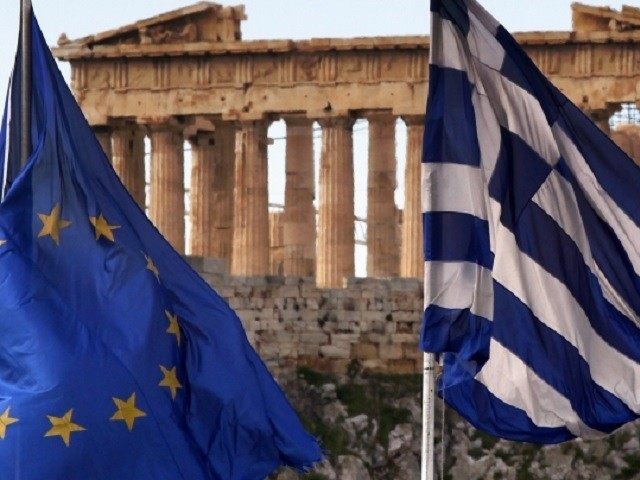Former French President Valery Giscard d’Estaing has said that Greece should leave the euro so it can devalue its currency and increase its economic competitiveness.
Giscard, who notably presided over the Convention on the Future of the European Union that drafted the ill-fated Treaty establishing a Constitution for Europe, told Les Echos that abandoning the single currency would be the best way for Greece to solve its debt crisis, echoing the words of UKIP leader Nigel Farage some years previously.
In an interview with the paper, Giscard said: “The fundamental question is whether or not the Greek economy can recover and prosper with a currency as strong as the euro. The answer is clearly negative,” he said. “Greece needs to be able to devalue its currency,” he added.
And he said an exit from the euro “on good terms” would allow for “a possible return at a later date”
“The entry of Greece into the euro in 2001 was a mistake,” he said. “I was against it at the time. The Germans too. They only accepted it because others, France in particular, insisted on it.”
And the left wing President appeared to share some sympathy with the Syriza party, saying that in order to fulfil their election pledges, they needed a devaluation of the currency.
“Quite simply because the programme it was elected on is impossible to execute with a strong currency. Greek production cannot regain its competitiveness with the euro at its current strength. As a result it cannot implement its economic programme, including raising the minimum wage and increasing social benefits.”
“It would be absurd to say this is a failure of Europe. Greece still has its place in the European Union. By leaving the euro, it would only be joining the countries like the United Kingdom, Sweden, the Czech Republic etc. that never adopted the single currency. More importantly, this exit would allow Greece to return at a later date.”
This orderly exit procedure should, and can, take place peacefully, in everyone’s best interest. It’s what I would call a ‘friendly exit’. Greece needs to be able to devalue its currency. If it does not do so, the situation will worsen, resulting in an even more severe crisis,” he warned.
Meanwhile, Der Spiegel magazine reports that the European Central Bank is making contingency plans for a possible Grexit if today’s talks fail. The German Chancellor Angela Merkel said all EU partners wanted to keep Greece in the euro but added, “There is a need for significant improvements in the substance of what is being discussed so that we can vote on it in the German Bundestag, for example next week.
Athens is determined to loosen the grip of the Troika and its forced austerity measures to revive its economy through demand side stimulus.
But Maltese Finance Minister Edward Scicluna echoed widespread exasperation with Greece when he told MaltaToday on Thursday: “I think they’ve now reached a point where they will tell Greece ‘If you really want to leave, leave’.”
As finance ministers head into talks, there is still a gulf which needs to be crossed if Greece, whose debt is 174 per cent of its GDP, remains as both an EU and EMU member.
Finance minister, Yanis Varoufakis, said on arrival for the Brussels talks that Athens had gone “not just the extra mile but the extra 10 miles” and it was up to its partners go the rest of the way.
“I have no doubt there will be a very collegial discussion and hopefully at the end of this we come out with some white smoke,” Varoufakis said.
The 240 billion euro bailout expires at the end of this month and Greece could run out of money by the end of March without new external funds, driving it nearer to the euro zone exit.
The chairman of the Eurogroup, Jeroen Dijsselbloem, said today is the deadline for a deal to be reached since any extension or change would require approval by several national parliaments.
Greece will no doubt be hedging their bets on the previous flexibility of EU deadlines and Merkel has in the past agreed financial rescues at the last moment if she could explain the future of the eurozone was at risk. As the country’s biggest creditor, owed 50 billion euro by Athens, Germany has the biggest incentive to keep Greece in the euro to avoid it defaulting. Such a move would be politically disease ridden for Mrs Merkel. Consequently, Berlin has been gently pushing the message that while a Greek exit is not desirable, it would be manageable.
Either way, Friday’s meeting looks set to be more akin to a game of poker than the game theory commentators have been making comparisons with.

COMMENTS
Please let us know if you're having issues with commenting.